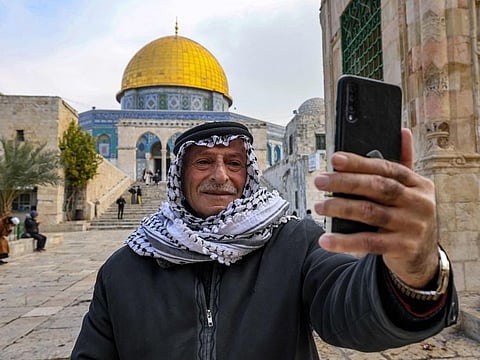Palestinians mull next moves after Al Aqsa provocation
Hamas does not want a new military escalation, expert says

GAZA CITY: Palestinians are holding urgent talks on their next moves after an extreme-right Israeli minister visited Jerusalem’s Al Aqsa mosque compound, a step so far met with stern words rather than violence.
There have been fears Tuesday’s controversial visit by Israel’s new national security minister, firebrand Itamar Ben-Gvir, could spark a war.
Palestinian militant group Hamas, which rules the Gaza Strip, had earlier warned such a move would be a “red line”.
Al Aqsa mosque lies in Israeli-annexed east Jerusalem and is the third-holiest site in Islam. It is the most sacred place to Jews, who refer to it as Temple Mount.
Hours after Ben-Gvir’s appearance at the sensitive site, Hamas and other militant groups held emergency meetings to discuss a “proportionate” response, sources within the movement told AFP.
Overnight a single rocket was fired from Gaza, though it failed to cross into Israeli territory and the launch went unclaimed by any group.
Jamal Al Fadi, a politics professor at Gaza’s Al Azhar University, said Hamas “does not want a new military escalation and is currently gauging American and Arab reactions”.
Ben-Gvir has gained notoriety for his anti-Arab rhetoric and his actions were roundly condemned by Arab nations, in what could prove a first test for the new government of Prime Minister Benjamin Netanyahu.
Washington, meanwhile, warned it could “provoke violence” and recalled a 2000 visit by Israel’s then opposition leader Ariel Sharon.
It became one of the main triggers for the second Palestinian intifada, or uprising, which lasted until 2005.
‘Great provocation’
Despite such a precedent, Fadi said Hamas may have shown initial restraint because it is “looking for gains for its citizens”.
Gaza’s 2.3 million residents are living under an Israeli-led blockade, imposed since 2007, and the academic said Hamas could have held off as a negotiating tactic.
Israel has issued a few thousand work permits to Gazans, in exchange for calm from the Palestinian enclave, with mediation from the United Nations, Egypt and Qatar.
Hamas has also sought to secure the release of Palestinian prisoners held by Israel, in exchange for the remains of two Israeli soldiers killed during the 2014 war and the return of two Israeli citizens presumed alive and held in the territory.
“Hamas will not make emotional reactions, but in the event of repeated assaults on holy sites, which will constitute a great provocation for the Palestinians and the Arab-Muslim world, it will create pressure for an escalation,” stressed Fadi.
Israel’s left-wing daily Haaretz cautioned a key moment would come Friday, when thousands of Muslims gather at the compound for prayers.
In the past there have been clashes between Palestinian worshippers and Israeli police officers, who control access to the site.
In the West Bank, Palestinian president Mahmoud Abbas said he would raise the issue at the UN.
The executive committee of the Palestine Liberation Organization (PLO), led by Abbas, is set to meet Thursday.
Nour Odeh, a Palestinian analyst, said the Palestinian Authority in the West Bank was “out of playing cards” and reliant on the reaction of Arab states.
“They (PLO) understand that the longer this goes on, the worse they’re going to look, if that’s even possible,” said Odeh, who had not expected an immediate response to Ben-Gvir’s visit.
“Ben Gvir is basically creating a pressure cooker situation that is already compounding a very tense situation on the ground,” she told AFP.
Last year more than 230 Palestinians and 26 Israelis were killed, the majority in the West Bank.
“He’s pushing for an explosion. What that explosion will look like, nobody knows.”



